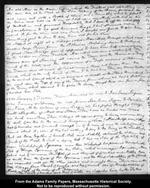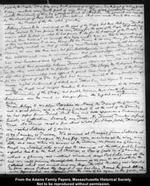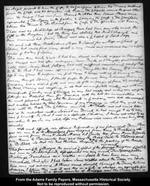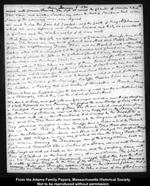round with Crimson Damask. The Seats all round the Chamber of crimson Velvet. This room and another, smaller one, where the Bishop sometimes took aside some of the Cannons, were very elegant.
We went to see the Casa del Cieudad: and the Castle of King Alphonsus which We were informed was Nineteen hundred and thirty six years old. It is of Stone and the Workmanship of it, very neat.
But there is in this City no Appearance of Commerce, Manufactures or Industry. The Houses are low, built of Brick and Mud and Pebble Stones from the neighbouring Fields. There was no Market worth notice. Nothing looked either rich or chearfull but the Churches and Churchmen. There was a Statue of Charles the fifth in the Cathedral Church, but very badly done, as were all the Statues and Paintings I had seen in all the Churches, for which reason among others I have taken no notice of them. Indeed it would be endless to describe all the Images of Angells and Statues of Saints who have been canonized not so much for their moral and social Virtues or their Christian Graces as for their Superstition and Enthusiasm, or what is worse for their pious frauds in the Service of the Sovereign Pontiffs. Besides I saw among them no Sculpture or Painting that was worthy of Observation or Remembrance.
There is here an Institution for the Education of noble Youths in Mathematicks and Philosophy, which they call the School of Saint Mark.
We dined at Leon, and got into our Carriages and upon our Mules, about one O Clock, to proceed on our Journey. We passed the new Bridge of Leon, which is a
beautifull Piece of Work, all of Stone. The River which comes down from the Mountains of Asturias, was not then very large, but in the Spring when the Snows melt upon the Mountains, it is swelled by the Freshets to a very great Size. This River also runs down into the Kingdom of Portugal. Not long afterwards We passed another Bridge over a River which the Peasants told me to call Rio y Puente de Biliarente. This River also comes from the Asturian Mountains and flows into Portugal. We passed through several little Villages, in every one of which We saw the Young People, Men and Women dancing the Fandango. One of the young Women beats an Instrument, somewhat like a Section of a Drum, covered with Parchment. She sings as well as beats on her drum, and the Company dance, with
[a] Pair of Clackers in the hand of every Man and Woman. The Clackers are two Pieces of Wood,
cutt handsomely enough, which they have the Art to rattle in their hands to the time of the Drum. They had all,
Men and Women Males and Females, wooden Shoes, in the Spanish fashion, that is mounted on Stilts. We stopped once, to take a view of one of these Companies.
Page 2
An old Man in the House before which the Festival was celebrating in the open Air, as he stood at the Door looking at the Dance, perceived Us and came out with a Bottle of Wine and a Tumbler, which he filled to the brim and held up to me, as I sat upon my Mule, with such an Air of Exultation and generous Hospitality, that I drank off the whole Glass in Complaisance to his good
humour, though I had afterwards reason to repent it, for the Wine was very sour. I directed our Guide to give him something and be sure to pay him well for his Wine.
We stopped at night at a Village called Mansillas, through which runs another large River from the Asturias, stretching down to Portugal. A great Stone Bridge over it, appeared to have been half carried away by the Water in some Freshett. Mansillas was once a Walled City. The Towers were yet standing all round the Town; and the Ruins and Fragments of the Wall, and the Appearance of a Foss around it still remain. The Towers were all made of small round Stones, not larger than two hands, which is the only kind of Stone to be had here. They are bound together by the ancient Cement which is as hard and as durable as the Stones themselves. We went upon the Top of one of the Towers, from whence We had a full View of the Town, which appeared to be gone to decay, though there were four or five Churches here still.
1780 January 7. Fryday.
From Mansillas We rode to San Juan Segun.
1780 January 8 Saturday.
We rode from San Juan Segun to Paredise de Nava. At the distance of every League, We had passed through a Village built altogether of Mud and Straw. They have no timber nor Wood nor brick nor Stone. These Villages all appear going to decay and crumbling to dust. Can this be the ancient Kingdom of Leon? Nevertheless every Village has Churches and Convents enough in it, to ruin it, and the whole Country round about it; even if they had nothing to pay to the King, or the Landlords. But all three together Church, State and Nobility exhaust the Labour and Spirits of the People to such a degree, that I had no Idea of the Possibility of deeper Wretchedness. Ignorance more than Wickedness has produced this deplorable State of Things, Ignorance of the true Policy which encourages Agriculture, Manufactures and Commerce. The Selfishness and Lazyness of Courtiers and Nobles, have no doubt been the Cause of this Ignorance: and the blind Superstition of the Church has cooperated with all the other causes and increased them. There were in this little Village four Parish Churches and two Convents one of Monks and one of Nuns, both of the order of St. Francis.
The Parish Churches and their Curates are supported here, by the
Tythes
Page 3
paid by the People. They pay every tenth pound of Wool; every tenth part of Wine, Grain, Honey; in short, every tenth part of
every thing. The good Curates sometimes
aleviate the Severity of this, by Compositions or Modus's. The Convents are supported by the Incomes of their Estates and foundations. But one would think this would require the Produce of the whole Country.
Nothing seems to be considered as the good of the People but their Religion. The Archbishop is said to have power to do every Thing for the good of the People. But when you enquire what he does or what he has power to do for the happiness of the People? to alleviate their burdens? or increase their Enjoyments? You are told he does nothing of all this, nor has power to do any thing. All his Power, to do every thing for the good of the People, consists in that of making new Parishes, and altering old ones at his Pleasure. We were told there were but four Archbishopricks in Spain. The Splendor of these Establishments may be conceived from that of Saint Iago whose Archbishop has one hundred and Eighty thousand Ducats a Year, in Rent. The War which then prevailed between France and Spain on one Side and England on the other, was said to be popular in Spain. The Clergy, the Religious Houses and other Communities had offered to grant large Sums of Money to the King for the Support of it. The English had become terrible to them, partly perhaps because English Sentiments of Liberty and Tolleration, had begun to creep in among the People and might threaten to become dangerous to the Wealth and Domination of the Clergy; and partly because their South American Dominions were too much in danger from the English and North America united.
From Astorga to this place Paredise de Nava, the Face of the Country was a great plain, and a striking Contrast to all the rest of the Country We had passed from Ferrol. But there was little Appearance [of] Improvement, Industry or Cultivation. Scarcely any Trees. No Forrest, Timber or fruit Trees. No Fences except a few Mud Walls for Sheep folds. This night We reached Sellada el Camino.
1780 January 11. Tuesday.
We arrived at Burgos, from Sellada el Caminos, four Leagues. We had fog, rain, and Snow all the Way, very chilly and raw. When We arrived at the Tavern, We found no Chimney, though my Servant who went out to examine all the other public houses reported this to be the best. A Brazier, or Pan of Coals in a Chamber, without a Chimney and without Windows except
Port holes, was all the heat We could procure. Uncomfortable however as We were, We went out to see the Cathedral which was ancient and very large. The whole Building was supported by four grand Pillars the largest I ever had seen. Round the great Altar were represented our Saviour, from the Scene of his Agony in the Garden, when
Page 4
an Angel presents to him the Cup, to his Crucifixion between two Thieves, his descent from the Cross, and his
Ascention into Heaven. The
Chappells round the great Altar were the largest I had ever seen. Round the Altar these several Stages were represented. 1 . The Agony in the Garden. 2. Carrying the Cross. 3. The Crucifixion between two Thieves. 4. The Descent from the Cross. 5. The
Ascention into Heaven.
There was no Archbishop at Burgos, there had been one, who made the fifth in the Kingdom: but the King had abolished this Archbishoprick and there remained but four. There was also a Chappell of Saint Iago.
We went into three Booksellers Shops to search for a Map or Chart of Spain, but could find none, except a very small and erroneous one in a Compendio of History of Spain.
For more than twenty Years I had been almost continually engaged in Journeys and Voyages and had often undergone severe Tryals, as I thought; great hardships, cold, rain, Snow, heat, fatigue, bad rest, indifferent nourishment, want of Sleep &c. &c. &c. But I had never experienced any Thing like this journey. If it were now left to my Choice to perform my first Voyage to Europe with all its horrors, or this journey through Spain, I should prefer the former. Every Individual Person in Company had a violent Cold, and were all of Us in danger of fevers. We went along the Road, sneezing and coughing, in all that uncomfortable Weather, and with our uncomforable Cavalry and Carriages, in very bad roads, and indeed were all of Us fitter for an Hospital than for Travellers with the best Accommodations on the most pleasant Roads. All the Servants in Company, were dull, discouraged and inactive, besides the total Ignorance of any Language in which they could converse with the People. The Children were sick. Mr. Thaxter was not much better, and as he understood neither Spanish nor French, he had enough to do to take care of himself. In short I was in a deplorable Situation. I knew not what to do nor where to go. In my whole Life my Patience was never so near being totally exhausted.
With much difficulty We obtained Information of our future rout. From Burgos We were to go to Monasterio, four Leagues, from thence to Berebiesca, wh four more; from thence to Santa Maria del Courbo, two; from thence to Courbo, one; thence to Pancourbo, two; and here the Road Parts to Vitoria and to Bilbao. So that We had thirteen Leagues to go to the parting of the Roads.
This famous City of Burgos, the ancient Capital of the famous renouned Kingdom of Castile and once an Archbishoprick, dissappointed me very much. The Squares, public Buildings, Fountains and Walks are said to have been once very remarkable. But after I had taken some Walks about the Town, my Expectations were not answered. A River runs directly through the Town, the River Aranzon [Arlanz n], I believe they call it, and this in a City is always an agreable Circumstance. There is a great number of Bridges over the River. There is




